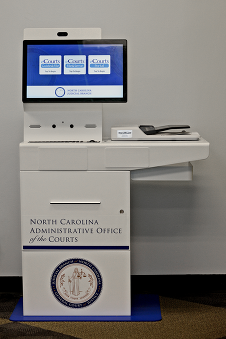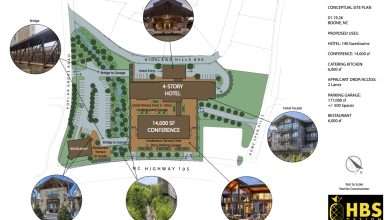
Last Updated on May 23, 2024 9:47 am
RALEIGH — New eCourts kiosks will be available in North Carolina courthouses starting in June. The kiosks will allow the public to more easily engage with the court system by providing on-site access to search court dates and case events, file documents electronically, make payments, and use a scanner, printer, or other services available through the Judicial Branch’s digital case management system that serves nearly half the state’s population.
The kiosk deployment will begin with an initial testing phase in June 2024 to distribute approximately 20 devices to the earliest adopters of eCourts in North Carolina, including courthouses in Harnett, Johnston, Lee, Mecklenburg, and Wake counties.
“As eCourts propels our state forward into the 21st century with digital access to justice for millions of North Carolinians, these all-in-one kiosks help meet the needs of folks who may not have connected devices or internet access,” said NCAOC Director Ryan S. Boyce. “We view these kiosks as force multipliers to the many court officials and staff who serve the public every day.”
In addition to printers, scanners, and payment services, the kiosks provide public access to eCourts’ primary applications for search (Portal), filing (File & Serve), and user-assisted interviews to help create common legal filings (Guide and File). Prior to eCourts, most North Carolinians could only access court records and case events at a clerk's office or at public computer terminals located inside courthouses. In the 27 counties using eCourts today, the public can file and access court records and make payments online from anywhere with an internet connection. New kiosks are another public access point to eCourts’ cloud-hosted, integrated software that is improving the court system by:
- Empowering the public to access justice online 24/7 instead of only inside courthouses during business hours to check court dates, find records, and file documents.
- Integrating with public safety systems to help court officials and law enforcement access critical information through connected applications in one system.
- Reducing travel time and supporting videoconferencing efficiency through shared digital access to records instead of printed documents.
- Replacing printed forms and records with electronic workflows to save millions of sheets of paper and valuable courthouse space.
- Standardizing court business processes and forms to promote consistency statewide.
- Updating hardware infrastructure, network bandwidth and wireless connectivity in courthouses for court officials and the public.
- Providing a training hub with on-demand training and Q&As for the public for electronic filing and search applications, Quick Reference Guides, FAQs, and workflows by case-type.
- Updating cybersecurity and data recovery capability systems from obsolete mainframe technology to the cloud.
- Streamlining judicial officials’ access to case data, dockets, and calendars in or out of the courtroom.
- Providing judges and staff remote access to electronic case files from different locations; in tandem with video conferencing, reduces travel time for rural and multi-county officials.
- Reducing lines at customer service counters and fewer phone calls, freeing up court staff to handle more complex issues for court customers.
- Centralizing a statewide financial management system to facilitate more convenient and timely payments to the court system.
- Delivering interview-based forms to the public in the online Guide & File service for the most common legal actions, reducing the number of returned forms that are filled out incorrectly resulting and result in court delays for self-represented litigants.
Learn more about eCourts at NCcourts.gov/eCourts.



















